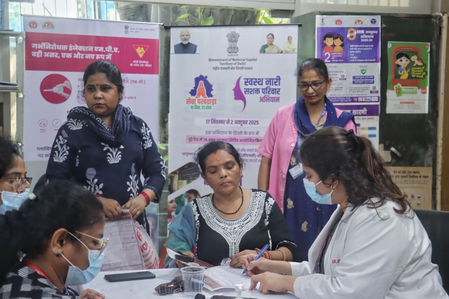
LOADINGERROR LOADING
If the state of the country is weighing on your mental health, you’re certainly not alone. Anxiety is up for many people, especially for those who are targeted by the Trump administration’s actions like increased deportations and restrictions on gender-affirming care.
While it’s important to be informed about what is going on politically, it’s also necessary to protect your mental health so you can move strongly forward into the coming days. This is particularly true if “you’re part of a marginalized group that’s currently being attacked,” said Emmalee Bierly, a licensed marriage and family therapist, co-owner of The Therapy Group and co-host of the “ShrinkChicks” podcast.
Advertisement
While no single mental health intervention can take away the harm that’s occurring, you can take baby steps to take care of yourself. One way to do that is by trying out “invisible days.” This is when you give yourself a day of self-care, away from your phone, the news, social obligations or whatever else it is that’s overwhelming you. Essentially, you disappear from public life for a moment and instead focus on activities that help your brain and body reset.
An invisible day is “a new term, but the concept of doing it has been around for a while,” said Tychelle Graham-Moskowitz, a licensed independent clinical social worker associate at Self Space in Washington state.
“One of the things that I really thought of when I heard the term ‘invisible day’ … was this concept of radical self-care, and that’s really not new at all,” Graham-Moskowitz added.
Advertisement
Radical self-care is about intention, she explained, and the same goes for invisible days. You’re intentionally giving your body and mind what it needs, whether that’s a day full of relaxation or a day spent exploring a new side of town.
“The thing I love about actively choosing to have an invisible day is that it is an active, intentional process,” said Jennifer Chaiken, a licensed marriage and family therapist who co-owns The Therapy Group and co-hosts the “ShrinkChicks” podcast with Bierly. “I think so often we get to this place where we have worn ourselves down so much that it ends up being more of a reaction where we’re just like, ‘OK, fuck it. I’m going to be off my phone. I’m not responding to this person.’”
When it’s intentional, it’s a choice and not a reaction, Chaiken added. You’re giving yourself this day before you’re totally depleted.
Advertisement
While not an official holiday, “Invisible Day” is technically celebrated by some on July 4. However, therapists say an invisible day is worth doing more often to help combat feelings of anxiety, anger, sadness and disconnection from yourself.
“I don’t think you have to be beholden to a specific day,” Graham-Moskowitz said. Instead, you can have an invisible day when you need it.
Here’s why invisible days are so important and how to add them to your routine:
Invisible days allow us to prioritize our needs and disconnect from others.
On an invisible day, give yourself permission to not be there for others (and to communicate that to those who need to step in and help, such as a partner or parent).
Advertisement
When you think about an invisible day, think about it in the most basic way, Bierly suggested. What does being invisible actually mean in terms of others getting in contact with you and how you interact with the world?
“Because I think that’s where we’re all feeling a lot of pressure right now. One, everyone has access to you, but we also have an incredible amount of pressure about what we owe to others, and I do believe we owe things to other people. I believe in community, but sometimes we just need a break,” Bierly said.
An invisible day gives you that time to take for yourself and “not be beholden to what other people need,” Graham-Moskowitz said.
Advertisement
Humans aren’t meant to have constant access to tragedy, as we do via social media and the 24-hour news cycle, Bierly noted. “We cannot help others if we’re also traumatized … so, the idea of invisible day gives us a small break from that.”
Invisible days can help regulate your nervous system.
An invisible day gives your nervous system a break from the hustle and bustle, and that’s crucial for your physical and mental health.
Advertisement
“Rest is so important. If you are not sleeping, if your nervous system is not regulated, if you are just constantly in the hustle, you’re not going to be doing well,” said Emma Shandy Anway, a licensed marriage and family therapist based in California.
When your nervous system isn’t regulated, you may feel depressed, angry, stressed and more.
“We have this concept in the psych world called the window of tolerance. [It’s] this idea that we all have this regulated place of homeostasis, a window of tolerance, and then outside of the window of tolerance is hyperarousal, where you get very dysregulated, stressed, angry,” Shandy Anway said. “And the reality is, unfortunately, in America, most people have a very tiny window of tolerance.”
Because of societal pressures, along with social media, constant emails and breaking news, many people’s window of tolerance is shrinking, leaving them chronically feeling mad or down, Shandy Anway added. “And what rest does is it helps increase that window of tolerance, so you actually end up in the day-to-day being in a more regulated state.”
Advertisement
Not only do invisible days help you have a lovely day in the moment, but they are restful, proactive care for your health, too, Shandy Anway said.
And they can give you a break from the online hyperconnectivity we all experience every day.
One of the big pillars of an invisible day is being off your phone and social media. While that may sound intimidating, it’s only a boon for your mental health.
“When we’re constantly connected to the world, hyperconnectivity can lead to all these feelings of loneliness and anxiety,” Bierly said.
Advertisement
While it’s easy to think hyperconnectivity is good, the opposite is actually true; constant emails, social media notifications and texts are not intentional connection, Bierly noted. Instead, this can overwhelm our nervous system.
“When our nervous system is incredibly overwhelmed, we cannot function in the same way. We cannot show up for ourselves. We can’t show up for others, our kids, our work, our friends … our dog,” Bierly said.
When you have an invisible day, it gives your nervous system a break from the barrage of online life. Staying away from distractions on your phone can also help you understand your needs, said Aerial Cetnar, a therapist and owner of Boulder Therapy and Wellness in Colorado.
Advertisement
“We live in such a fast-paced environment … information is coming at us often and we are over-consuming,” Cetnar said. “Sometimes it can feel overwhelming in that being so connected can feel obligatory at times … so when you start to feel obligated and responsible for responding to emails, text messages, it creates anxiety.”
They are especially beneficial for those who deal with anxiety or burnout.
An invisible day is a “way to disconnect from feeling overwhelmed, burnt out, being in-demand, being judged or perceived. Because we are more visible today than we’ve ever been and that can be really overwhelming,” Cetnar said, referring to the visibility that comes with life online.
For someone who deals with anxiety, overwhelm or burnout, having a day to disappear and listen to no one’s needs but your own can be helpful, she added.
Advertisement
More, it can help you reconnect with yourself in a world where your attention is “constantly being pulled outward,” said Chaiken, whether that’s by work, relationships, social media or something else.
When you’re disconnected from your needs, it naturally leads to burnout and anxiety.
Here’s how to have an invisible day.
A good first step is putting an invisible day on your calendar, Chaiken said. This way, you’ll actually do it.
You should also tell those who normally need you throughout the day that you’re having an invisible day, whether that’s a partner, boss or parent, so they plan their day accordingly, Chaiken said.
Advertisement
It’s also a good idea to take some time to journal before your invisible day and ask yourself, “What would feel good to me?”
“It’s a simple question, but a lot of times … people are so disconnected from their own sense of self and desire that they don’t even know where to start,” Shandy Anway said.
Ask yourself what activities, food or entertainment would feel enriching “and see what you can come up with. I like to call this a brain dump … you just dump as many ideas as you can and then see what sparks your excitement,” Shandy Anway explained.
Advertisement
20 Years OfFreeJournalism
Your SupportFuelsOur Mission
Your SupportFuelsOur Mission
For two decades, HuffPost has been fearless, unflinching, and relentless in pursuit of the truth. Support our mission to keep us around for the next 20 — we can’t do this without you.
We remain committed to providing you with the unflinching, fact-based journalism everyone deserves.
Thank you again for your support along the way. We’re truly grateful for readers like you! Your initial support helped get us here and bolstered our newsroom, which kept us strong during uncertain times. Now as we continue, we need your help more than ever. We hope you will join us once again.
We remain committed to providing you with the unflinching, fact-based journalism everyone deserves.
Thank you again for your support along the way. We’re truly grateful for readers like you! Your initial support helped get us here and bolstered our newsroom, which kept us strong during uncertain times. Now as we continue, we need your help more than ever. We hope you will join us once again.
Support HuffPost
Already contributed? Log in to hide these messages.
If you can’t commit to a full day (and not everyone can), take two or three hours after work and do what your mind and body needs. “You can also take invisible half days, [invisible] hours. Do what works for you,” Chaiken said. No matter your schedule or personal demands, there are ways to work invisible time into your schedule.
Advertisement
In terms of how frequently you do this, it’s also up to you. You could do it just one day a year, “but clearly we all need it way more,” according to Bierly.
As long as you listen to yourself and your needs, there is no wrong way to have an invisible day or an invisible few hours.



